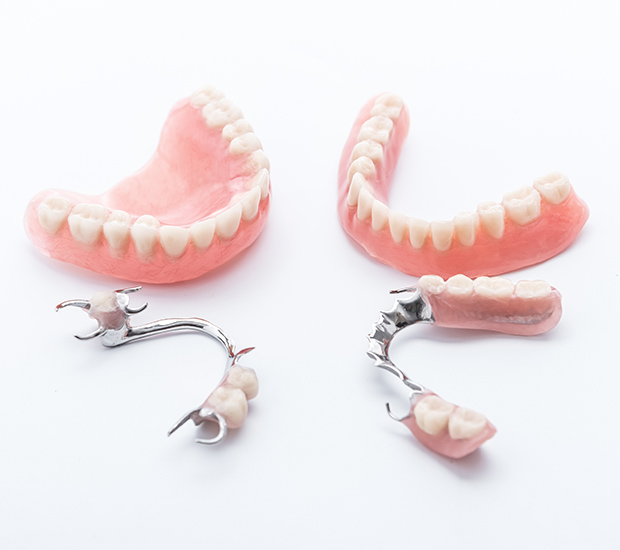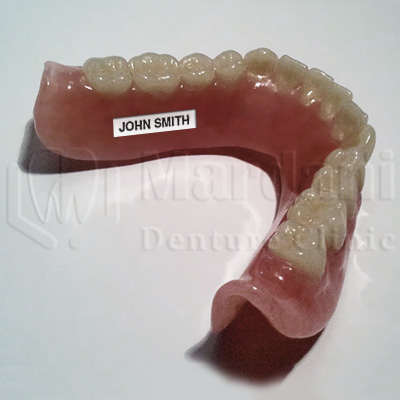Why a Denturist?
Replacing your teeth is more than trusting someone with your smile. Your appearance and your entire image is at stake. Your denturist is an expert in design and construction, fitting and adjustment of your dentures.
A denturist fabricates a denture according to your personal needs and desire. This ensures the quality of care is consistent, custom and personal.
Full & Partial Dentures
Complete dentures replace all missing natural teeth while a partial denture fills in only the spaces created by missing natural teeth and prevents teeth from changing position or from withstanding too much pressure when chewing. Proper care can prolong the lifespan of dentures and contributes to a healthy mouth. An average lifespan of dentures is 5-7 years and they should be assessed annually by your denturist because your mouth is always changing, so your dentures will need adjusting or relining from time to time to make sure they fit well. Poorly fitted dentures may cause denture sores that make oral cancer more difficult to spot.
Implant Supported Dentures
Implants are a great solution for people who cannot wear lower dentures and are tired of a continuous ill fitting denture or someone with a severe gag reflex and cannot withstand a full palate on a full upper denture. As you age, the bone continues to resorb, sometimes to the point where the ridge disappears entirely, resulting in ridge underneath for the lower denture to seat upon. Benefits of implants can allow you to eat foods that you have avoided for years.
Immediate Dentures
An immediate denture is an alternative to being without teeth during the initial healing period after you natural teeth have been removed. It is made prior to the extraction of your natural teeth and also acts as a bandage during the healing period to prevent bacteria and food debris from getting into the extraction sites. The benefit of immediate dentures is that you are not without teeth during the healing period, which can take up to 6 months. An immediate denture can be made to replace a single tooth to all your teeth.
Relines (Soft Liner Alternative)
As you age, your mouth will continue to change as the bone underneath your denture shrinks. To maintain a proper fit, it may become necessary to reline your dentures. Average time for relines is about every 2-3 years and varies from individual to individual. The soft liner alternative is a liner that is placed in usually a complete lower denture where the individual does not have much of a ridge left and experiences continuous sore spots. The material provides a soft layer to act as a cushion between the hard base of the denture and the soft tissue on the lower ridge.
Repairs and Tooth Addition
Dentures can develop weak areas that may result in fractures of the denture base or denture teeth. Sometimes dentures are dropped accidentally and this may also cause fractures and breakages in dentures. Generally simple fractures and breaks can be repaired in office while you wait.
Denture Cleaning & Labelling
Over time dentures will emit a bad odour cause by absorption of fluids and bacteria. Stains and calculus deposits resulting from various foods, liquids and saliva need to be removed to maintain good oral health and denture care just as you would when you see the hygienist to have your natural teeth cleaned and scaled.
To clean your dentures, remove them from your mouth and run them under water to rinse off any loose food particles. Then wet a denture brush or a regular soft-bristle toothbrush and apply denture cleaner or a mild soap. Household cleaners and regular toothpaste are too abrasive and should not be used for cleaning dentures. Gently brush all surfaces of the dentures including under the clasps where bacteria collect. Be careful not to damage the plastic or bend the clasps. Rinse your dentures well in clean water before placing them back in your mouth.
While your dentures are removed, be sure to clean and massage your gums. If your toothbrush hurts your gums, run it under warm water to make it softer or try using a finger wrapped in a clean, damp cloth. If you have partial dentures, brush your natural teeth with a soft-bristled toothbrush and floss.
Always remove your dentures overnight to give your mouth a chance to rest. Soak them in room temperature water with or without denture cleanser. When you’re not wearing your dentures, keep them in water to stop them from drying out or warping. Never use hot water for soaking, as it may warp the acrylic on the denture.
Anti - Snoring Devices
Simple snoring can disturb others and cause a dry mouth or sore throat. Heavy snoring is often a symptom of sleep apnea, which is associated with hypertension, stroke and other cardiopulmonary problems.
House Calls
For those who have difficulty with mobility, out of office visits are offered. This helps the individuals and also caregivers or family members that normally need to take time off. We'll save you some trouble and go directly to the individual in need.
Please ask us if you have any questions.
Let us help you decide if the choice is right for you



